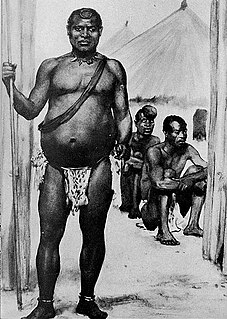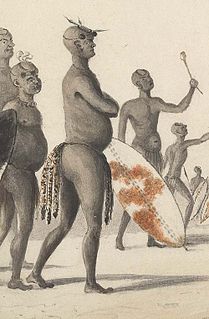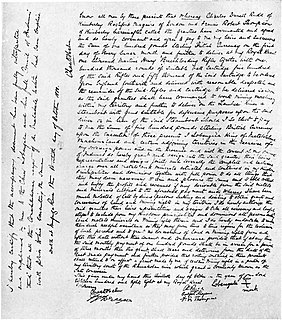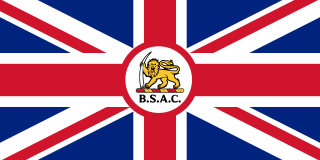The Dongas Tribe was a collection of road protesters and travellers in England, noted for their occupation of Twyford Down outside Winchester, Hampshire. The name Dongas comes from the Matabele word for "gully", given by Winchester locals to the deep drovers' tracks on Twyford Down.

Southern Rhodesia was a landlocked self-governing British Crown colony in southern Africa, established in 1923 and consisting of British South Africa Company (BSAC) territories lying south of the Zambezi River. The region was informally known as south Zambesia until annexed by Britain at the behest of Cecil Rhodes's British South Africa Company, for whom the colony was named. The bounding territories were Bechuanaland (Botswana), Northern Rhodesia (Zambia), Moçambique (Mozambique), Transvaal Republic.

Lobengula Khumalo was the second king of the Northern Ndebele people. Both names in the Ndebele language mean "the men of the long shields", a reference to the Ndebele warriors' use of Nguni shield.

MzilikaziKhumalo was a Southern African king who founded the Mthwakazi Kingdom now known as Matebeleland, in Zimbabwe. His name means "the great road". He was born the son of Mashobane kaMangethe near Mkuze, Zululand, and died at Ingama, Matebeleland. Many consider him to be the greatest Southern African military leader after the Zulu king, Shaka. In his autobiography, David Livingstone referred to Mzilikazi as the second most impressive leader he encountered on the African continent.

The Pioneer Column was a force raised by Cecil Rhodes and his British South Africa Company in 1890 and used in his efforts to annex the territory of Mashonaland, later part of Zimbabwe.
Northern Ndebele, also called Ndebele, isiNdebele, Zimbabwean Ndebele or North Ndebele,. Associated with the term Matabele, is a Bantu language spoken by the Northern Ndebele people which belongs to the Nguni group of languages.

The First Matabele War was fought between 1893 and 1894 in modern-day Zimbabwe. It pitted the British South Africa Company against the Ndebele (Matabele) Kingdom. Lobengula, king of the Ndebele, had tried to avoid outright war with the company's pioneers because he and his advisors were mindful of the destructive power of European-produced weapons on traditional Matabele impis attacking in massed ranks. Lobengula reportedly could muster 80,000 spearmen and 20,000 riflemen, armed with Martini-Henry rifles, which were modern arms at that time. However, poor training meant that these were not used effectively.

The Second Matabele War, also known as the Matabeleland Rebellion or part of what is now known in Zimbabwe as the First Chimurenga, was fought between 1896 and 1897 in the region later known as Southern Rhodesia, now modern-day Zimbabwe. It pitted the British South Africa Company against the Matabele people, which led to conflict with the Shona people in the rest of Southern Rhodesia.

HMS Matabele was a Tribal-class destroyer of the Royal Navy that saw service in World War II, being sunk by a U-boat on 17 January 1942. She has been the only ship of the Royal Navy to bear the name Matabele, which in common with the other ships of the Tribal class, was named after an ethnic group of the British Empire. In this case, this was the Anglicisation of the Ndebele people of Zimbabwe.

The Rudd Concession, a written concession for exclusive mining rights in Matabeleland, Mashonaland and other adjoining territories in what is today Zimbabwe, was granted by King Lobengula of Matabeleland to Charles Rudd, James Rochfort Maguire and Francis Thompson, three agents acting on behalf of the South African-based politician and businessman Cecil Rhodes, on 30 October 1888. Despite Lobengula's retrospective attempts to disavow it, it proved the foundation for the royal charter granted by the United Kingdom to Rhodes's British South Africa Company in October 1889, and thereafter for the Pioneer Column's occupation of Mashonaland in 1890, which marked the beginning of white settlement, administration and development in the country that eventually became Rhodesia, named after Rhodes, in 1895.

The Sunbeam Matabele was a British 12-cylinder aero engine that was first flown in 1918. The Matabele was the last iteration of one of Sunbeam's most successful aero engines, the Cossack.

The Sunbeam Cossack was a British 12-cylinder aero engine that was first run in 1916. The Cossack spawned a family of engines from Sunbeam.

The Shangani Patrol was a 34-soldier unit of the British South Africa Company that in 1893 was ambushed and annihilated by more than 3,000 Matabele warriors in pre-Southern Rhodesia, during the First Matabele War. Headed by Major Allan Wilson, the patrol was attacked just north of the Shangani River in Matabeleland, Rhodesia. Its dramatic last stand, sometimes called "Wilson's Last Stand", achieved a prominent place in the British public imagination and, subsequently, in Rhodesian history, similarly to events such as the Battle of the Little Bighorn and the Battle of the Alamo in the United States.

Mthwakazi is the traditional name of the proto-Ndebele people and Ndebele kingdom and is in the area of today's Zimbabwe. Mthwakazi is widely used to refer to inhabitants of Matebeleland Province in Zimbabwe.
Uwini was Makalaka leader from Zimbabwe. He was considered a divinity. He was in the resistance against the British colonialism and was accused of participating in the murder of white settlers by the British South Africa Company. He was tried by court-martial and executed on the edge of the Somaboola (Somabhula) Forest about 80 miles from Bulawayo in 1896.

The British South Africa Company's administration of what became Rhodesia was chartered in 1889 by Queen Victoria of the United Kingdom, and began with the Pioneer Column's march north-east to Mashonaland in 1890. Empowered by its charter to acquire, govern and develop the area north of the Transvaal in southern Africa, the Company, headed by Cecil Rhodes, raised its own armed forces and carved out a huge bloc of territory through treaties, concessions and occasional military action, most prominently overcoming the Matabele army in the First and Second Matabele Wars of the 1890s. By the turn of the century, Rhodes's Company held a vast, land-locked country, bisected by the Zambezi river. It officially named this land Rhodesia in 1895, and ran it until the early 1920s.

Men of Men is a novel by Wilbur Smith, the second in the Ballantyne Novels series. It is set in the 1880s during the colonisation of Rhodesia and the First Matabele War and climaxes with the Shangani Patrol.

The Angels Weep is a 1982 novel, the third in Wilbur Smith's series about the Ballantyne family of Rhodesia. The first part of the book is set immediately before and during the Second Matabele War, then the second part jumps forward to the final days of the Rhodesian Bush War.

The Leopard Hunts in Darkness is a novel by Wilbur Smith set in the early days of Zimbabwe's independence and is the fourth in Wilbur Smith's series about the Ballantyne family of Rhodesia.

The Battle of the Shangani took place on 25 October 1893, during the First Matabele War in what is now Zimbabwe. A British column was attacked during night by a large force of Matabele warriors. The British were able to repulse them with heavy loss of life to the Matabele force. The battle is noted for being the first battle in which the Maxim gun played an important role.















